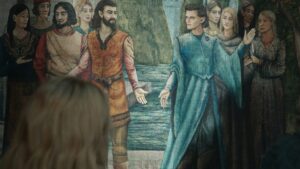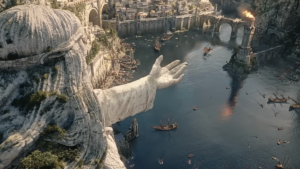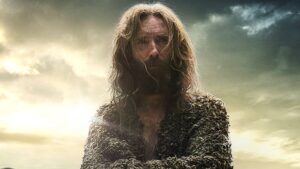MAJOR SPOILERS FOR THE RINGS OF POWER EPISODE FOUR AHEAD!
“At the feet of the mountain were built the tombs of the Kings, and hard by upon a hill was Armenelos, fairest of cities, and there stood the tower and the citadel that was raised by Elros son of Eärendil, whom the Valar appointed to be the first King of the Dúnedain.”
– The Silmarillion: Akallabêth, p. 312
The text I have quoted above, which comprises part of a brief description of the island kingdom of Númenor in The Silmarillion, contains the very first instance of the name Armenelos in J.R.R. Tolkien’s posthumously published writings on Middle-earth (when Tolkien passed in 1973, he left The Silmarillion unfinished, and the task of piecing together a cohesive narrative from his scattered notes fell upon his youngest son, Christopher). Since The Silmarillion‘s publication in 1977, the name Armenelos has popped up again in Unfinished Tales and a few other places, but it never appeared in The Lord Of The Rings or its appendices, and was never added retroactively by either of the Tolkiens.

This may seem a small thing, but if you’ve been following my blog for any length of time, you probably know where this is going. Yes, I was surprised – stunned, even – when the name Armenelos was casually used in conversation in the fourth episode of Amazon’s The Rings Of Power: which has until now drawn on The Lord Of The Rings and its appendices exclusively for information regarding Númenor and the events of the Second Age. Discounting all the place-names from Unfinished Tales that appeared on Amazon’s first official Rings Of Power tie-in map, which have deliberately been left off the map used throughout the series during scene-transitions, this usage of the name Armenelos marks the first time that something supposedly off-limits to the showrunners and writers has worked its way into The Rings Of Power.
So how did this happen? As far as we know, Amazon does not own the rights to The Silmarillion and Unfinished Tales, and there is no evidence to suggest that has changed. In this very episode, two characters reminisce about the land of Beleriand that sank beneath the sea at the end of the First Age, but they refer to locations there like the Mouths of Sirion only in vague terms, as though the writers were legally unable to use names from The Quenta Silmarillion (the third, and longest part of The Silmarillion, which deals with the wars in Beleriand) and instead had to resort to implication. My fool’s hope is that the Tolkien Estate is providing Amazon access to materials in both The Silmarillion and Unfinished Tales on a case-by-case basis.
Until we learn more, however, I will lower my expectations slightly and assume that the terms of this agreement with the Tolkien Estate apply only to the specific chapter of The Silmarillion where the name Armenelos originated, Akallabêth – an appendix of sorts that deals with the history of Númenor and its people. And make no mistake, Akallabêth may only be thirty pages long but it’s a goldmine: of all Tolkien’s writings on the Second Age, it’s the only one that covers the decline and eventual downfall of Númenor in great detail. It is here, and here alone, that Tolkien transcribes the dialogues on death between the mortal Men of Númenor and the immortal Elven ambassadors out of Valinor; here, and here alone, that he reports on Sauron’s seduction of the Númenóreans; here, and here alone, that he records the warnings of the Valar, which went unheeded by all but a few. With minimal expansions and additions, the materials in this appendix alone could easily fill out three or four seasons of The Rings Of Power.
Still, if the writers are theoretically allowed to use anything in Akallabêth that the Tolkien Estate is willing to sell (and Amazon is willing to pay for), one has to wonder why they settled on the name Armenelos, and how they convinced the higher-ups at Amazon to spend what I can only assume was a hefty sum of money for this obscure place-name, which they’ve used exactly once – not on the map of Númenor, where it would arguably help viewers get geographically situated, but as part of an improvised speech by the Númenórean politician Pharazôn (Trystan Gravelle) outside the Guild-Hall, where guild-members are gathering to complain about the possibility of tireless, immortal Elves stealing their jobs (more of that one-note fantasy racism that the writers must have thought was clever enough to include at the expense of character-building moments). Gravelle’s Pharazôn, a charismatic dictator in-the-making, reminds them that they alone are responsible for all of Númenor’s great accomplishments throughout history, from the vastly overstated military victories of Elros Tar-Minyatur, the first King, to the building of Armenelos, and vows that Elves will never take that away from them.
But while Pharazôn gains favor with the citizenry of Númenor, Queen-Regent Tar-Míriel (Cynthia Addai-Robinson) alone amongst her people can see that Númenor is falling out of favor with the Valar, Middle-earth’s gods, as her people turn away from Middle-earth in its hour of need, forsaking their old bonds of fellowship with the Elves. The falling petals of the White Tree growing in the Court of the Kings are a clear sign that the Valar weep for Númenor, one that even Pharazôn recognizes, but Tar-Míriel has seen in her dreams something far worse – a vision of the sea rising high over Númenor’s green hills before crashing down upon the land, carrying away the towers and palaces of fair Armenelos, pulling Míriel and all her people to a watery grave.
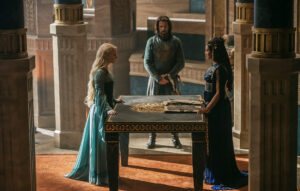
J.R.R. Tolkien was haunted by a similar dream throughout his life, and it was a trait he passed on to both his son Michael and to the character of Faramir in The Lord Of The Rings. From this vivid dream sprang fully-formed the story of Númenor, an ancient island kingdom comparable to Atlantis, sucked into the abyss by a “great dark wave”. Though the tale evolved over time, the significance of the Great Wave never diminished. Quite the opposite. In-universe and to some extent in real life, Tolkien postulated that dreams of the Great Wave were attributable to some cultural memory of Númenor left to linger in the minds of Men by the descendants of that traumatic event’s survivors – who naturally began referring to Númenor as Atalantë (the Downfallen), which then became Atlantis, by which name we know it today.
As one of the first recipients of this unsettling dream, chronologically at least, The Rings Of Power‘s Tar-Míriel has no way of knowing whether the “great dark wave” is a literal or metaphorical manifestation of the gods’ discontent, but it doesn’t really matter to her – either way, she’s just witnessed the imminent destruction of all that she holds dear in Númenor, and that can’t be a good thing. Searching frantically for a solution, Míriel first has to reverse-engineer her own problem. She comes to the bewildering conclusion that Galadriel (Morfydd Clark) is the problem, so she has the Elf imprisoned…then has her released and sent back to Middle-earth to try and appease the Valar…then realizes at the last minute that the Valar brought Galadriel to Númenor for a reason, so she calls her back.
Structurally, this storyline is by far the weakest of the four we’re currently following because there are so many other characters in Númenor besides Galadriel and Míriel that The Rings Of Power is simultaneously trying to establish, which frequently requires jumping away from the characters that matter most to spend time with characters like Pharazôn’s unexciting and extraneous non-canonical son Kemen (Leon Wadham), who I gave the benefit of the doubt going in because other non-canonical characters like Eärien (Ema Horvath) had impressed me, only for him to disappoint greatly as a character in terms of both personality and design. As a result of all this needlessly urgent subplot-hopping that leaves little space for organic character and plot development in the main storyline, our protagonist’s motivations change from scene to scene with barely any build-up.
With all that said, when Galadriel and Tar-Míriel actually do interact, their scenes are invariably among the episode’s highlights – boasting some of the most eloquent dialogue in the series, and two phenomenal performances from actresses of equal regality whose characters balance each other out: the one confident, reckless to a fault, and slightly incompetent (I love Galadriel, but we all know it to be true), the other self-doubting and subsequently slow to action, but a capable leader when nudged in the right direction. They are also alike in many ways. Galadriel tells Míriel that she knows what it is to be the only one aware that something is terribly wrong, and the only one whose opinion is never asked for, or dismissed when proffered, because speaking the harsh truth makes her unpopular with those who would sugarcoat it.
However, as Galadriel’s suspiciously politically-savvy traveling companion Halbrand (Charlie Vickers) advises her while the two spend time together in a Númenórean jail-cell, there is a time and place for sugarcoating the truth when it will benefit you. It’s an underhanded tactic, one which Galadriel has never had the patience for, as she prefers to rush head-on at all her problems with the mindset of a warrior: even when attempting to follow Halbrand’s advice, she still resorts to beating up Pharazôn and a few Númenórean guards and breaking into the chambers of the old king, Tar-Palantir (Ken Blackburn), without any consideration for the consequences of her actions. Thankfully for her, Pharazôn either has a very short memory or was offered something by Halbrand after the camera cut away from them that convinced him to hold his tongue.
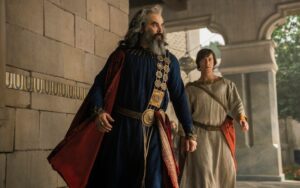
While this could conceivably count as a plot-hole, until and unless additional context for Pharazôn’s inaction comes to light, it doesn’t quite beggar belief like the idea that a single Elf could persuade Númenor to go to war in the Southlands based on one man’s unreliable testimony, without the backing of her own High King and without even fully comprehending the situation or the strength of her opposition. I understand that Galadriel is reckless, but Tar-Míriel is evidently not, and yet she demands no further information from Galadriel than the two scraps of paper she stole from the Hall of Lore that “prove” Sauron is regaining strength in the Southlands and that Halbrand is the long-lost king who can unite the Southlanders against him. Funny, isn’t it, that Halbrand is behind all of this?
What Galadriel doesn’t know is that the enemy in the Southlands whom she has been led to believe is Sauron (again, by Halbrand) is in fact an Elf – one played with cold majesty by Game Of Thrones‘ Joseph Mawle – who goes by the title “Adar“, the Sindarin Elvish word for father. Theories abound as to who this character is, or could have been in the distant past: popular suggestions include Maglor, the only surviving son of Fëanor who was scarred, physically and mentally, by the burden of the unbreakable Oath he and his father swore and which they could never fulfil; Maeglin, a Dark Elf who betrayed the location of Gondolin to Morgoth in the First Age and was thrown from the city’s parapets as a result (although in the chaos, no one ever recovered his body from the flames below); and the nameless Elf captured by Morgoth long before the First Age began, who was corrupted “by slow arts of cruelty” in the dungeons of Utumno until they became the first Orc or half-Orc.
There are clues pointing in every direction. Adar’s dark hair would suit either Maglor or Maeglin. The metal gauntlet he wears on his left hand supports the theory that he’s Maglor, whose hand was burned by the Silmaril he carried for a time…but Adar also has burn marks along the sides of his face, which could have come from centuries of torture in Utumno, or from being tossed into the fires that raged around Gondolin. It is he who mentions growing up in Beleriand and traveling down “the river” (likely referring to the River Sirion), and his breastplate depicts a winding river as well. Maglor would have gone down the River Sirion on his way to the Third Kinslaying. But what could have happened to Maglor that would soften a Fëanorian’s heart towards Orcs, the greatest enemies of his people? That’s more of a Maeglin thing, and Maeglin could have traveled down the Sirion with the refugees from Gondolin as well.
The problem with most of these theories is that most of the characters Adar could be, like Maglor and Maeglin, are mentioned only in The Quenta Silmarillion – and as we’ve established, Amazon probably doesn’t have those rights. If they do, it’s not something they’ve indicated yet, and the time to introduce Maglor and/or Maeglin was long ago, in the prologue to The Rings Of Power‘s very first episode. To retroactively explain who these characters are, and what their relevance is to the current story, would require extensive flashbacks at this point, which seems wasteful seeing as neither Maglor nor Maeglin is relevant, quite frankly, to the story of the Second Age. Both the Silmaril that Maglor carried and the city of Gondolin that Maeglin betrayed are lost forever beneath the waves of the Sundering Sea.
Well…there is one other connection between these characters and the current story that could be exploited for dramatic effect in The Rings Of Power, but only if Amazon has the rights to do so. Both Maglor and Maeglin are linked to the character of Elrond (Robert Aramayo). It was Elrond’s grandfather who pushed Maeglin off the walls of Gondolin after Maeglin tried to abduct his wife and son, Elrond’s father Eärendil. And during the Third Kinslaying, when Eärendil and Elrond’s mother Elwing fled across the sea to Valinor, it was Maglor (with his brother Maedhros) who rescued their twin sons and hid them in a cave, raising them as if they were his own children. None of this has been mentioned in The Rings Of Power yet, but Elrond has been talking a lot about his father recently.
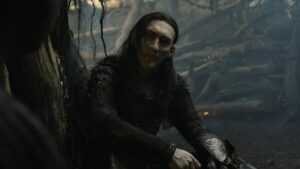
What we learn about Eärendil in this episode is virtually everything that The Rings Of Power can legally say about him – that he was a great mariner, who led the host that defeated Morgoth at the end of the First Age and was afterwards appointed by the gods to safeguard one of the three Silmarils, which he took into the heavens with him. Once again, I have to applaud the writers for taking all of this arcane information, which to the average viewer means absolutely nothing on its own, and making it relevant in the context of the show. When Elrond observes his friend Durin IV (Owain Arthur) struggling under the weight of his father’s impossible expectations for him, he shares the story of his own father’s legendary exploits and awkwardly tries to make a point about family in a sincere attempt at outreach that comes across as self-centering and slightly condescending.
This has been a problem for Elrond, however, since the very first episode – when he told Galadriel that if she stopped fighting for once, she could focus on being his friend…as if Galadriel, who is several-thousand years older than Elrond, doesn’t have slightly more important things to do with her life than help an aspiring politician impress any one of his many morally ambiguous father figures. In this episode, it’s revealed that Durin IV and his wife Disa (Sophia Nomvete) don’t even trust Elrond completely, not so much because they think ill of him personally but because they can sense he’s being manipulated. Durin tells his father that he intends to go to Lindon and figure out what High King Gil-galad is using Elrond for, but he really ought to be keeping his eye on Celebrimbor (Charles Edwards), who is even more blatantly weaponizing Elrond’s innocence for his own gain.
Durin gets the upper hand by forcing Elrond into a tricky situation from which the Elf can only extricate himself by swearing an oath to protect the greatest secrets of the Dwarves – an oath nearly as dangerous as that which Fëanor and his sons swore, with the potential to curse all of Elrond’s kin to sorrow if broken. This whole plot-point was created for The Rings Of Power, but I suppose it could explain why, canonically, Elrond’s family was so singularly unlucky. No spoilers, but the poor guy is abandoned by pretty much everyone he loves. If you’re familiar with Peter Jackson’s film trilogy, you probably already know about the fateful choices of Arwen Undómiel, Elrond’s daughter, but that’s only the tip of the iceberg. His grief has multiple layers.
All that Elrond gains from swearing this terrible oath is advance-knowledge of mithril, the new ore discovered by the Dwarves in the mines beneath Khazad-dûm…and it’s not like Elrond can do anything with that information yet anyway, although he does walk away with a small chunk of mithril, a gift from Durin IV – from which I am certain either he or Celebrimbor will forge a Ring of Power in the near future: specifically Nenya, one of the Three Rings made exclusively by and for the Elves without interference from Sauron, which was given to Galadriel. Seeing as Amazon is compressing the timeline of Middle-earth’s history to the point where Khazad-dûm will likely be destroyed before the end of the Second Age (was that a Balrog’s roar we heard as the mine-shaft collapsed around Durin and Elrond?), mithril will soon become a scarce and prized commodity in the show, and even a little will go a long way.
Now that we have reached the midpoint of the first season, which has been quietly laying the groundwork for the forging of the Rings, it’s safe to assume that Elrond and his supporting cast of characters will gradually come to the forefront in the remaining four episodes until the season finale presumably reveals that their subplot has been, all along, the main event. I am still fairly confident – despite all the mounting evidence that Halbrand is a baddie – that Sauron is already deeply entrenched in Eregion, where he’s manipulating Celebrimbor. Halbrand I believe to be a servant of Sauron’s, likely the future Witch-King, assigned with keeping Galadriel distracted in the Southlands until Celebrimbor’s great forge is ready to take its first commission.
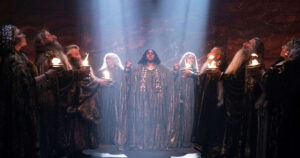
And Sauron being the type to try and kill two birds with one stone, I believe that Galadriel will accidentally remove the last obstacle standing between Sauron and his plans to conquer the Southlands – Adar, who is clearly revered by the Orcs that used to follow Sauron. With Adar gone (because there’s no way Galadriel doesn’t personally take him off the board before season’s end), Sauron will be able to swoop in and effortlessly regain control of his old armies, but first he’ll give the Orcs plenty of time to inflict heavy casualties on the Southlanders and Númenóreans, thereby ensuring that there will be little resistance to his eventual takeover when he gets around to it.
There’s one wildcard that Sauron probably hasn’t taken into account, and that’s Theo (Tyroe Muhafidin), a young boy who is now in possession of a magical sword bearing the mark of Sauron, which seems to have powers and detrimental side-effects like those of the Morgul-blades wielded by the Nazgûl in The Lord Of The Rings – except that Theo isn’t affected by these side-effects which appear to be leaving a toll on his friend Rowan (Ian Blackburn), and nor is the old barkeep Waldreg (Geoff Morell), in whose barn Theo discovered the sword. Waldreg even rolls up his sleeve to reveal that he repeatedly used the sword in the same way Theo has, by stabbing its hilt into his forearm to activate the blade with his blood. My guess is that they both come from a long lineage of Sauron-worshippers, but that doesn’t explain why Adar is so desperate to get his hands on this sword.
In a harrowing long-shot sequence that once again demonstrates why Middle-earth is a veritable playground for horror auteurs interested in experimenting with fantasy elements on a grand scale, Theo is hunted by Orcs through the burning ruins of his hometown, smoked out of various hiding-places, and eventually lured into the arms of Vrath (Jed Brophy), possibly the most genuinely terrifying Orc to date in any adaptation of Tolkien’s works – so naturally he, Vrath that is, is killed off immediately. The Rings Of Power has many more well-designed and almost entirely practical Orcs where he came from, but none played by Brophy, who gave Vrath a little more personality than your run-of-the-mill Orc.
The Orcs’ canonical aversion to sunlight is also being played up, which means that action scenes involving Orcs end abruptly as soon as the sun rises and begin again after nightfall, except indoors and underground – assuming The Rings Of Power remains consistent with regards to this, and the Orcs don’t suddenly develop an immunity to sunlight when it’s time for a battle, we could be in for some really compelling “keep them fighting until the dawn” type scenarios where the characters are worn down and exhausted, but still need to hold out for an hour more: a bit like how Gandalf defeated the Trolls in The Hobbit, but sans the ventriloquist act.
Something else I had written down in my notes – while Wayne Che Yip’s direction and cinematography remain superior to J.A. Bayona’s in my opinion, he needs to chill out with all the slow-motion, because after a certain point it starts to get really obnoxious. The use of slow-motion also particularly de-emphasizes the innate speed and agility of the Elves, which could be intentional if the idea here is still that the Elves are just ordinary people with an aloof attitude they haven’t earned, but given that this episode finds Elrond eavesdropping on Durin and Disa from at least a mile away with the help of his enhanced eyesight and hearing, I kinda wish The Rings Of Power would choose a direction and commit to it fully. Are the Elves “magical” or not? Do they have special abilities as a reward for being Eru’s favorite children, or is all that pro-Elf propaganda we’ve been fed in The Silmarillion merely lies, to paraphrase Adar?
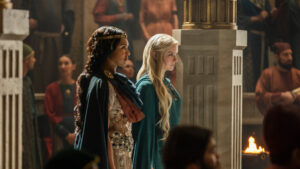
Personally, I would admire The Rings Of Power greatly if it deconstructed some of Tolkien’s favorite problematic tropes (namely, as you can probably guess, the whole Race Of Inherently Beautiful People Predisposed Towards Good trope that has proved so popular with white supremacists over the years), and I feel like if ever there was an opportunity to do just that, it would be in a story that encompasses all the greatest failures of Men and Elves in the Second Age. Now that we’re halfway through the first season and I’ve seen what the series’ best writers are capable of, I’ve come to expect more from The Rings Of Power in this regard than the occasional threadbare metaphor for racism (we haven’t reached Shadow And Bone-level lows, thank goodness, but we’re too close for comfort). While the fast pacing doesn’t often allow for much nuance and depth, that’s a problem the writers and director need to sort out if they ever plan to tackle Akallabêth.
Showrunners J.D. Payne and Patrick McKay (who co-wrote this episode along with Paper Girls‘ Stephany Folsom) have guaranteed that The Rings Of Power, with its bright color palette and heroic protagonists, welcomes no comparisons to House Of The Dragon – but that doesn’t mean it must shy away from being complex, even subversive, in the way Tolkien’s own writing increasingly grew to be as he revised it later in his life. Otherwise, it runs the risk of appearing merely trite, and no amount of lore sprinkled into the dialogue will be able to redeem it then.
Episode Rating: 7.5/10

